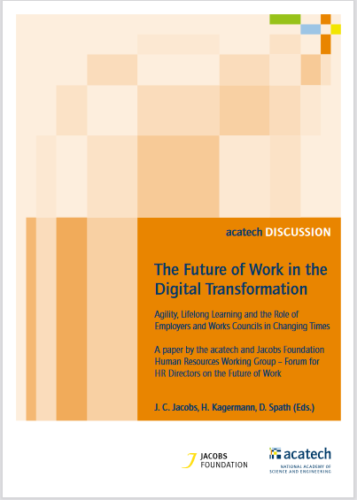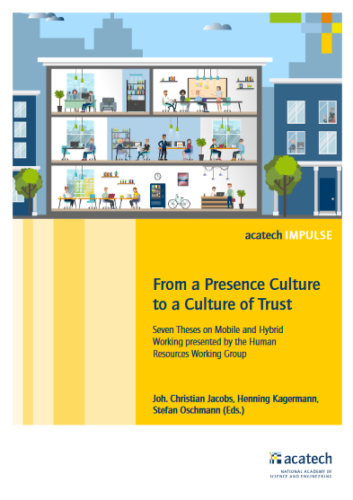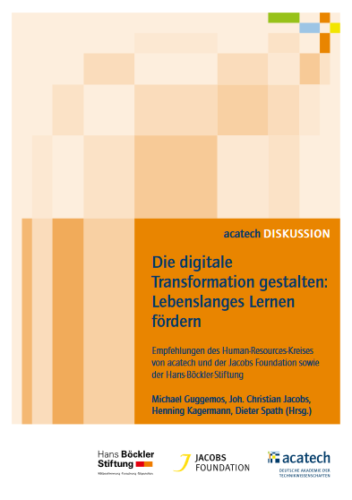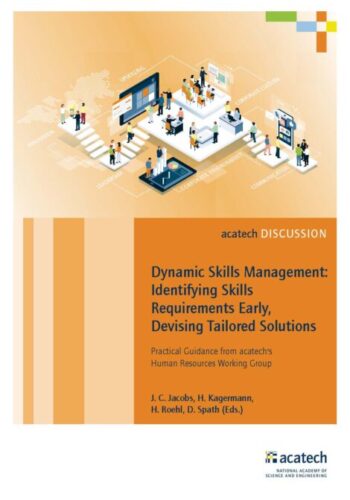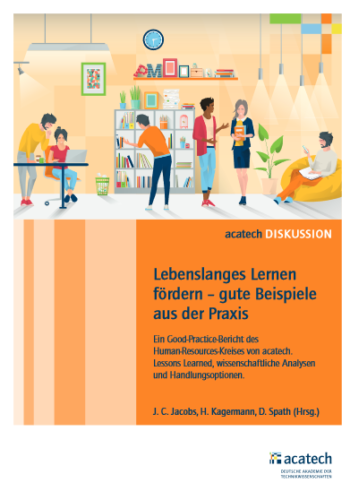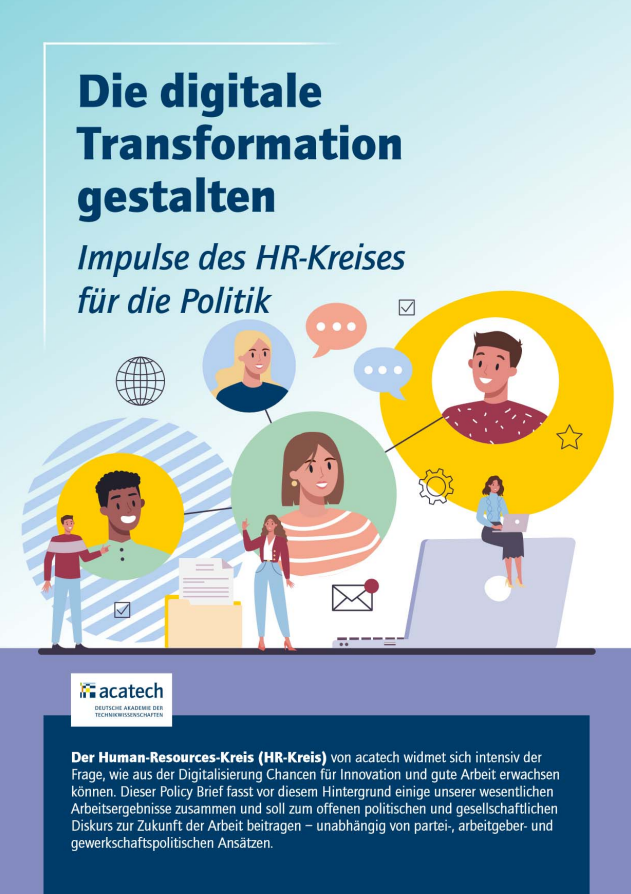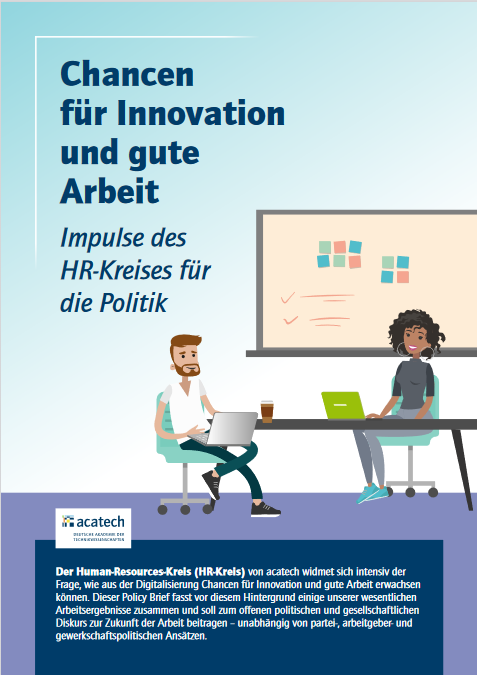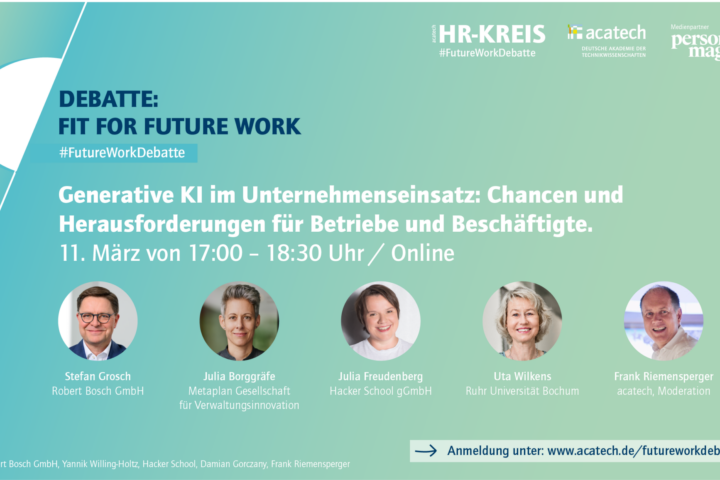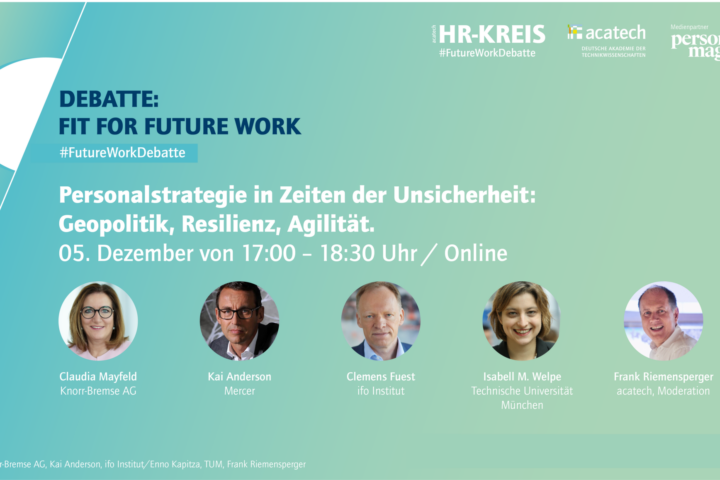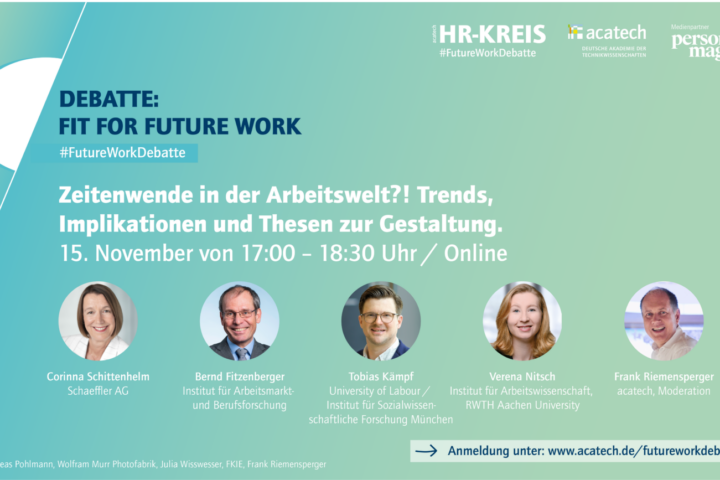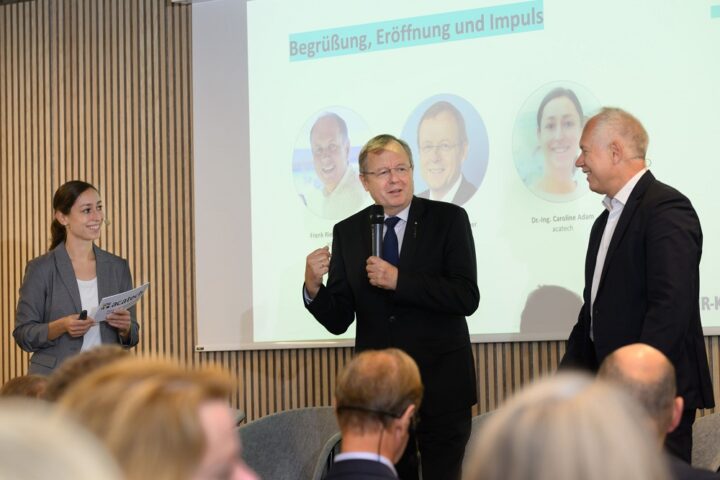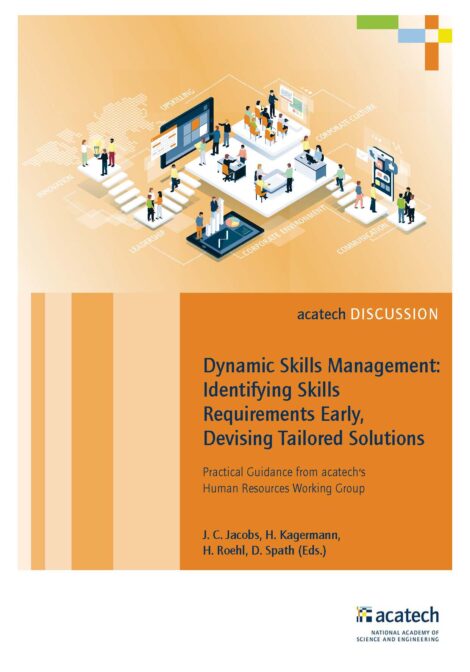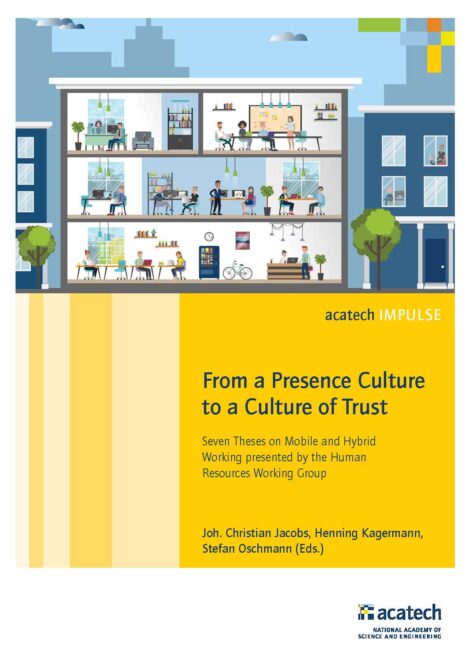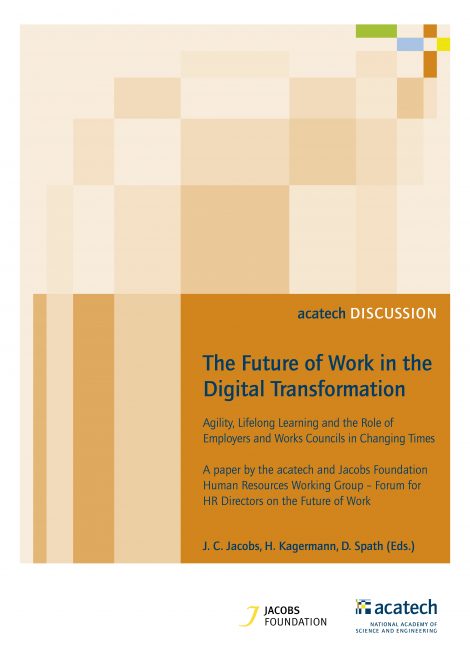acatech’s Human Resources Working Group – the forum for Chief Human Resources Officers (CHROs) on the future of work

© iStock.com/svetikd
In its Human Resources Working Group, acatech brings together figures from industry and science to engage in a confidential dialogue on strategy. The experts exchange views on how companies, employees, business partners and politicians can shape the digital transformation together. In addition, they ask how opportunities for innovation and good work practices can be gleaned from digitalisation. As a think tank in the debate about the future of work, the Human Resources Working Group wants to create awareness of the most urgent challenges and contribute to political and societal discourse.
#FutureWorkDebatte – an interim conclusion
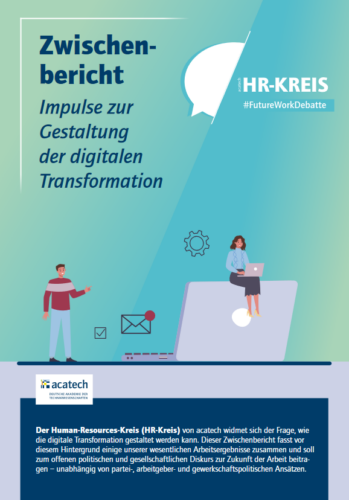 Frank Riemensperger, acatech Executive Board and spokesperson for acatech’s Human Resources Working Group summed up the #FutureWorkDebatte as follows: “The truly fascinating result for me is: the key to the success of the digital transformation is a company’s “digital culture” and not the technology. Part of such a digital culture is the provision of digital training but, most especially, the company’s ability to work “digitally” day to day. What exactly does that mean? It means data-driven processes, agility, flat hierarchies, quick decision-making, room for error and being open to rapid change. We’ll have more on this soon!” In December 2022, acatech’s Human Resources Working Group published its interim conclusion based on the first six online debates. The theories expounded therein on the digital transformation in the world of work form the basis for discussion of the #FutureWorkDebatte 2023.
Frank Riemensperger, acatech Executive Board and spokesperson for acatech’s Human Resources Working Group summed up the #FutureWorkDebatte as follows: “The truly fascinating result for me is: the key to the success of the digital transformation is a company’s “digital culture” and not the technology. Part of such a digital culture is the provision of digital training but, most especially, the company’s ability to work “digitally” day to day. What exactly does that mean? It means data-driven processes, agility, flat hierarchies, quick decision-making, room for error and being open to rapid change. We’ll have more on this soon!” In December 2022, acatech’s Human Resources Working Group published its interim conclusion based on the first six online debates. The theories expounded therein on the digital transformation in the world of work form the basis for discussion of the #FutureWorkDebatte 2023.
Members of acatech’s Human Resources Working Group
The majority of the members of acatech’s Human Resources Working Group are CHROs of leading technology companies and service providers. In addition, acatech members and science experts are involved and bring to the table the latest findings from educational research, human factors as well as business administration and organisation. The hosts are Mr Riemensperger, acatech Executive Board member, and Henning Kagermann, Chairman of the acatech Board of Trustees.
Members of acatech's Human Resources Working Group
- Julia Bangerth, DATEV eG, Chief Operating Officer
- Katharina Baran, TÜV Rheinland AG, Mitglied des Vorstands
- Dr. Sebastian Beck, Festo SE & Ko. KG, Vorstand Finance and Human Resources
- Khadija Ben Hammada, Merck KGaA, Chief HR Officer (CHRO)
- Birgit Bohle, Deutsche Telekom AG, Mitglied des Vorstands, Bereich Personal, Arbeitsdirektorin
- Susan-Stefanie Breitkopf, Carl Zeiss AG, Mitglied des Vorstands, Chief Transformation Officer
- Prof. Dr. Svenja Falk, Managing Director bei Accenture / Honorarprofessorin an der Justus-Liebig-Universität Gießen
- Markus Fink, Infineon Technologies AG, Globale Gesamtverantwortung für den Bereich Personal & Organisation
- Dr. Astrid Fontaine, Schaeffler AG, Vorständin Personal und Arbeitsdirektorin
- Stefan Grosch, Robert Bosch GmbH, Geschäftsführer und Arbeitsdirektor
- Michael Halberstadt, Flughafen Berlin Brandenburg GmbH, Geschäftsführer Personal
- Beatrix Henseler, Sartorius AG, Head of Human Resources
- Dr. Immanuel Hermreck, Bertelsmann SE & Co. KGaA, Mitglied des Vorstands, Bereich Personal
- Prof. Dr. Katharina Hölzle, Leitung des IAT der Universität Stuttgart sowie des Fraunhofer IAO / acatech Mitglied
- Ilka Horstmeier, BMW AG, Mitglied des Vorstands, Personal- und Sozialwesen, Arbeitsdirektorin
- Prof. Dr. Henning Kagermann, acatech, Vorsitzender des Kuratoriums
- Dr. rer. pol. Achim Kassow, Münchener Rück AG, Mitglied des Vorstands, Ressort Asia Pacific and Africa, Zentralbereiche Central Procurement und Global Real Estate and Services, Bereich Personal, Arbeitsdirektor
- Nicole Kurek, SICK AG, Mitglied des Vorstands
- Dr. Claudia Mayfeld, Knorr-Bremse AG, Mitglied des Vorstands, Weltweite Verantwortung für Integrität, Recht und Personalwesen
- Sabine Mlnarsky, Commerzbank AG, Mitglied des Vorstands, Group Human Resources und Arbeitsdirektorin
- Dr. Michael Moser, Fresenius SE & Co. KGaA, Vorstand für Recht, Compliance, Personal, Risikomanagement und ESG
- Dr. Thomas Ogilvie, Deutsche Post DHL Group, Mitglied des Vorstands, Bereich Personal
- Prof. Dr. Manfred Prenzel, Zentrum für LehrerInnenbildung der Universität Wien, Leiter / acatech Mitglied
- Frank Riemensperger, acatech Präsidiumsmitglied
- Prof. Dr. Steffi Robak, Institut für Berufspädagogik und Erwachsenenbildung, Leibniz Universität Hannover
- Petra Scharner-Wolff, Otto Group, Konzern-Vorständin Finanzen, Controlling, Personal
- Martin Seiler, Deutsche Bahn AG, Vorstand Personal und Recht
- Prof. Dr. Isabell M. Welpe, Technische Universität München, Lehrstuhl für Strategie und Organisation / acatech Mitglied
Since it was set up in 2014, acatech’s Human Resources Working Group has become firmly established in working to define attractive jobs that are fit for the future and to attract, educate and support the skills development of workers in technology and the natural sciences.
Objective of the Working Group and how it sees itself
Work, leadership and organisational processes within companies are being completely overhauled as part of the digital transformation. Hence our understanding of work and the nature of working is permanently changing.
Many stakeholders in Germany underestimate how radical and rapid these changes need to be. It is central to their success that companies actively shape this shift. International competition surrounding the digital transformation is putting Germany’s status as an innovation hub under considerable pressure. Germany is particularly reliant on innovation in order to safeguard economic growth and prosperity as well as public sector viability against the backdrop of demographic change.
The objective of acatech’s Human Resources Working Group and how it sees itself is therefore:
- To learn from one another (sharing experience in relation to shaping the digital transformation, cultural change, etc.)
- To be an independent forum of experts for politicians (dealing with fundamental/longer-term topics of relevance to society; no lobbying)
- To assume social responsibility (build trust – promote change).
Key areas of action
Companies and employees must benefit in equal measure from the transformation in the world of work. It should be ensured that digitalisation is mainly implemented by people for people to obtain a win-win outcome for society; technological developments must be considered and designed from the point of view of the needs of workers and end-users.
The Human Resources Working Group regards the following as key areas of action in shaping the transformation:
- An agile corporate structure and work organisation not only increase the speed at which companies adapt in the digital transformation and increase their innovative capacity, they also give workers more flexibility and autonomy.
- Lifelong learning is the key to increasing companies’ productivity and capacity to innovate and, at the same time, to increasing the capacity to work and employability of workers.
- Employees should have a say in the shaping of the digital transformation. This requires governance that encourages a willingness to change and creates freedom to experiment.
The German and English versions of the full publication are available to download here:
Post-Covid world of work
The digital transformation and the Covid crisis have brought about a shift in the world of work: hybrid working models in the form of a flexible mix of different forms of work and organisation both within and outside the office will play a major role in the long term.
To ensure good, creative and productive working, including remotely/in hybrid models, businesses should focus more on three areas of action in particular: In addition to a corporate and management culture that encourages working with autonomy and personal responsibility, adapted spatial and technical solutions are required.
“The role of leader will move more towards the role of mediator; that is, the manager will go from being an instructor to a facilitator. The paradigm of top-down leadership was outdated even before Covid and will be untenable in the post-pandemic era. Instead, what is needed is plenty of communication and trust, to empower workers.”
Elke Frank/software AG
acatech’s Human Resources Working Group outlines seven perspectives on the working relationship of the future, put forward as a proposal to the various stakeholders in the digital transformation: the perspectives aim to facilitate future-oriented organisational development as well as encourage productivity, innovation and good work practices in Germany.

The German and English versions of the full publication are available to download here:
Lifelong learning
Digitalisation is speeding up technical, economic and societal developments in a way that is also completely changing learning: we will be able to frontload knowledge and skills less and less in future. Lifelong learning will therefore be a critical success factor – for companies, individual careers as well as for workers’ capacity to work and for employability. Many companies in Germany have already started fostering lifelong learning more strategically. Together with employees and social and business partners, they are developing innovative approaches for future-oriented education and training.
Shaping the digital transformation: encouraging lifelong learning
acatech’s Human Resources Working Group and the Hans Böckler Stiftung have proposed solutions for how we in Germany have to position ourselves in order to be able to react quickly and broadly to the change in the world of work. They shed light on the acute challenges facing the training of today and tomorrow. Particular emphasis is put on the development of knowledge and skills that is needed for the digital transformation.
The approaches from business practice described and the policy options adopt, in particular, the perspective of workers who are in employment and whose fields of work will be altered by the structural changes.
“The digital transformation necessitates continuous further training – but it also makes lifelong learning easier. For example, with the aid of artificial intelligence, learning progress can be better checked and learning needs more accurately identified. AI-based systems spot patterns in the content the learner is having difficulties with and give learning recommendations and assistance accordingly.”
Joh. Christian Jacobs, Managing Partner Joh. Jacobs & Co. (AG & Co.) KG
The German version of the full publication is available to download here (in German):
Dynamic skills management
Targeted training geared towards the individual company strategy requires a business analysis to be conducted and skills needs to be defined. In many businesses, the skills management requirements have changed greatly: What are our target groups? What exactly do we want to qualify the workers to do? What specific content do we want to deliver?
These questions can only be answered in a meaningful way if companies align their own HR planning and development with HR and corporate strategy objectives as well as the technological developments and changes in environment that are to be expected. Employees also have a good deal of personal responsibility for their own learning journey – but they need guidance in relation to their personal acquisition of knowledge and skills.
Between February 2019 and September 2020, a working group from within acatech’s Human Resources Working Group discussed what is specifically required for business practice and developed a method of skills needs analysis.
In a number of workshops and review loops with CHROs from the member companies within the Human Resources Working Group and after a successful trial run in the companies, we have developed a guide for business practice.
The English version of the full publication is available to download here:
Examples of good practice
In a Good Practice report, acatech’s Human Resources Working Group showed how exactly lifelong learning can be implemented in companies: in it, companies such as BMW, Otto Group and Deutsche Telekom give insights into how they use innovative learning platforms and tools for self-guided, needs-based training.
“The examples we collected show that companies’ training offerings are directed at achieving this goal. Lifelong learning has therefore been recognised at the top level of the hierarchy as a critical factor in the success of the digital transformation. We will continue to work with acatech’s Human Resources Working Group on this key topic.”
Dieter Spath
However, there is no generic, one-size-fits-all solution for organising good, productive learning. Many companies therefore try out new forms of learning and teaching. Key issues here are the design of motivating work environments that are conducive to learning and the possibility of breaking out of current rigid thought patterns and exploring new territory. Overall, it is a matter of creating the scope and flexibility for learning together and thereby realising the potential for creativity and development in a more targeted way.
The authors of the report have compiled a list of ten lessons learned to highlight the adjustments that need to be made for lifelong learning to work in companies:
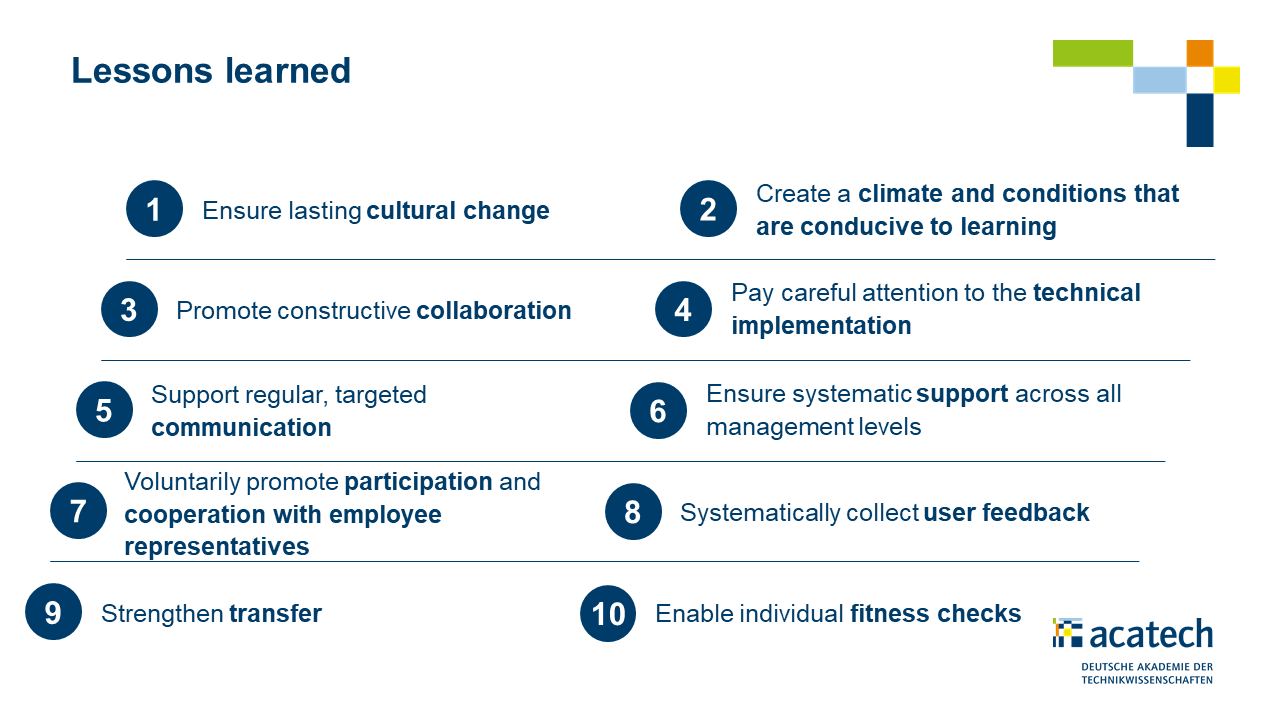
The German version of the full publication is available to download here (in German):
Policy Briefs of acatech’s Human Resources Working Group
Online meetings, working from home, remote leadership: for many workers in Germany, this is the new reality of work after two years of the Covid pandemic. To facilitate good hybrid working, the regulatory framework must be adapted accordingly, states acatech’s Human Resources Working Group in a new Policy Brief.
The HR experts identify three key areas of action and give ideas for how rapid improvements can be made:
1. Mobile and hybrid working: ability to work from home in Munich, Milan and Madrid – without regular inspection
Flexible working hours and locations must be organised in such a way that employees and companies benefit equally: in addition to making the employer more attractive, resulting in employee retention and recruitment of urgently needed skilled labour, this can increase employee satisfaction and motivation.
The authors reject a legislative drive to promote mobile working. Instead, legislators should provide for the equal treatment of working from home and mobile working in terms of health and safety at work; the German workplace regulation (Arbeitsstättenverordnung) should not apply. Otherwise the company would have an obligation to (ergonomically) fit out the workplace of choice as well as the obligation to carry out a regular inspection and hazard assessment. The resulting additional bureaucracy for companies and financial administration would be considerable, according to the publication.
An employee can even work from home abroad now – however, in the view of the HR experts, this is too often associated with negative implications for the taxation of pay and for employees’ social security cover. To better facilitate cross-border mobile working therefore, limited tax liabilities for the German employer under foreign law and payroll tax liabilities abroad must be avoided. The legislator should make it clear that, in such cases, there is no workplace within the meaning of the law. Harmonisation of tax law and social security law, at least in the European Union, would be welcome.
2. Worker participation: embracing more virtuality
The authors state that worker participation in Germany can be described as very constructive and responsible overall, and works councils are important partners and fellow travellers of the companies. A culture of participation, which aligns the requirements for companies to be able to change with the interests of employees, could become a German USP in the digital transformation.
However, for this to happen, worker participation must be modernised to an extent that goes beyond the Works Council Modernisation Act. At the moment, in the opinion of the HR experts, this law imposes too heavy an administrative and financial burden on companies. During the Covid pandemic, temporary derogations were introduced – for example, works meetings could be held virtually – which facilitated worker participation while adhering to company infection control measures. These derogations should become the rule rather than the exception, according to the Policy Brief.
3. Qualification: individual rather than general training entitlements
Hybrid working is heavily dependent on digital skills. During the two pandemic years, employees came to grips with many new digital possibilities and expanded their knowledge. But gaps still exist; lifelong learning remains – notwithstanding the above – a critical success factor in the advancing digital transformation, write the authors.
Companies and employees have a shared responsibility in this respect: companies must create work environments that are conducive to learning, support needs-based individual learning processes and motivate employees to learn. Insofar as they are able, employees learn in a more self-guided way with greater personal responsibility.
However, training must remain under the companies’ control. General provisions in the form of statutory training or extensive exemptions would conflict with the need to encourage lifelong learning geared towards the specific needs within the company and the individual requirements of the employees.
In the case of reskilling, e.g. transferring employees from one job to another, however, the constructive and future-oriented interaction of all stakeholders is decisive.
The German version of the full publication is available to download here (in German).
acatech’s Human Resources Working Group identifies key areas of action in shaping the digital transformation of the world of work. The experts from science and industry call for a rethink from managers and business partners – and put the onus on policy makers when it comes to lifelong learning and making working hours flexible.
The key to current and forthcoming challenges lies in the digital transformation: if Germany takes the opportunities afforded by technological change to overhaul industry and the world of work, the impact of the Covid crisis and demographic change on the labour market could be lessened. acatech’s Human Resources Working Group, which includes CHROs of leading technology companies and service providers as well as scientists, shows in a new Policy Brief how opportunities for innovation and good work practices can be gleaned from digitalisation.
According to the experts, the three key elements are: encouraging lifelong learning, increasing the adaptability of companies and employees, and safeguarding worker participation. The Human Resources Working Group puts the onus on policy makers: for example, by introducing a tax exemption, they could increase employees’ motivation to engage in lifelong learning. They should also better tie in state development offerings and measures with the current requirements of business practice. To enable employees to work a way that gives them more say and flexibility, the amendment of the provisions on maximum working hours or minimum breaks should also be given consideration.
In this respect, the Human Resources Working Group calls on companies to experiment with participation options. The German version of the full publication is available to download here (in German).



